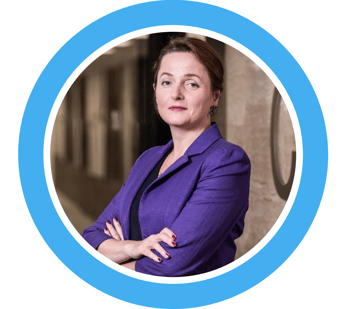Digital transformation is rapidly changing the finance industry, driven by emerging technologies that are creating both challenges and opportunities for businesses and governments alike. The finance industry is a sector where digital transformation has the potential to significantly improve customer experience and deliver better, more personalised financial products and services. However, with these opportunities come challenges, such as data privacy and security risks, a lack of technological infrastructure, and changing regulations.

In our latest Fireside Chat, Standard Chartered Bank’s MD of Digital Channels & Data Analytics, Rowena Everson, discusses digital transformation challenges and opportunities, including:
- What are the most important trends in emerging technology for the Finance industry, and how will they change the sector in the coming years?
- What impact will digital investment deliver for customer engagement, and how will digitisation revolutionise consumer behaviour?
- What new uses will come up for emerging tech like Blockchain, and how can we develop them?
- How must governments and businesses evolve individually and work together to support the flexible, international workforces of the future?
- What are the challenges of being a woman in male-dominated industries such as tech, banking, and finance?
Watch on-demand our Fireside Chat with Standard Chartered Bank’s MD of Digital Channels & Data Analytics, Rowena Everson.
Having a passion for your job can make it feel less like work and more like something you enjoy every day, even if it's challenging. What aspects of your current role are you most excited about?
My primary objective in my current role is to improve the digitisation of our client interactions within the corporate and institutional bank rather than the retail bank, which we don't have representation for in this region. This involves a mixture of large-scale programmes that include re-platforming our primary proprietary channels, such as cash, trade, and foreign exchange, as well as exploring new and emerging technologies to better serve our clients. Working with some of the largest global multinationals and financial institutions in Europe and the Americas is an added bonus of working in this region.
Typically, these businesses are highly advanced and sophisticated, with a strong focus on digital technology. So, I'm very interested in always being on the lookout for innovative technologies that can help them run their operations more efficiently and effectively. The pace of change in every industry is getting faster, with a growing trend towards a 24/7 global business culture. This shift is driven by consumers and their expectations for instant gratification. In our personal lives, we expect to be able to get things done whenever we want. If you wake up at 2 o'clock in the morning, for example, and suddenly remember you haven't organised something important for your family, if you're a bit like me, you might want to be able to jump online and take care of it right away.
This trend towards instant access and immediate action is very much replicated in the business environment. One of the emerging technologies that are supporting the trend towards 24/7 operations and giving customers greater control and flexibility over their treasuries and payment flows is blockchain technology. While there are many exciting areas of development in the banking industry, such as data science and AI, the opportunities that blockchain presents are certainly among the most intriguing. With the potential to transform the way we handle financial transactions and manage our treasuries, it's clear that blockchain technology will play a significant role in shaping the future of banking and is certainly one of the most exciting areas we're looking at.
At Standard Chartered Bank, our focus is always on our clients and meeting their specific needs. We are committed to co-creating solutions with our largest clients, working with third-party providers to achieve the outcomes that our clients require for their businesses. This approach is central to our ethos and has always been at the heart of how we do business. We are not just a bank that offers a range of services; we are a client-led business that strives to create solutions that work specifically for our clients. As we move forward, we see a strong emergence in this space, and we hope to become one of the leading players in the field of client-led solutions.
Don’t miss out on – Surprising Data Trends and Challenges for 2023
In today's business landscape, customer experience (CX) has become a top priority for most industries, including banking. Considering this, can you share your thoughts on what impactful changes customers can expect to experience and enjoy from Standard Chartered Bank's investment in innovation in the near future?
I think there's a lot of adoption of emerging technologies and ways of using those technologies, such as blockchain, that will have a significant impact. Another impactful change is the shift in the relationship between the different participants in the financial ecosystem. In the past, banks, corporate clients, and vendors had very distinct roles. However, we're now seeing more genuine partnerships and co-creations, which are creating a more integrated and collaborative ecosystem.
The term "partnerships" is frequently used these days, but in the financial ecosystem space, such as with blockchain and embedded finance solutions, success is completely dependent on all parties being well integrated and able to work together seamlessly. So I believe that the changing relationship between participants in the financial ecosystem, along with the adoption of emerging technologies, are two key areas to watch. This leads me to another topic that often comes up in the media: what role banks will play in the future and whether fintech will supersede banks completely.
The media often poses those kinds of questions, but banks do have a crucial part to play in the financial ecosystem, particularly in providing liquidity and traditional fiat rails for payments. However, larger global banks also have the opportunity to participate in the ecosystem in different ways, such as through partnerships with clients who want more control over their treasury flows. Enabling clients to run their businesses more effectively is important. Lastly, there are opportunities that data will bring us.
The potential of data is a topic that has been widely discussed, and it's not limited to any specific industry. Organisations that have access to a large amount of historic and current data are considering ways to monetise it effectively. However, only a few have succeeded in doing so. The challenge lies in not only monetising the data but also using it to gain better predictive outcomes to drive the business. By leveraging data, businesses can focus on opportunities that are most likely to be successful and allocate resources accordingly. This applies not only to the financial industry but also to other sectors, such as HR consultancy and recruitment. The ability to effectively utilise data can give organisations a significant advantage and help them stay ahead of the competition.

Take your business to the next level – The CIO/CTO Guide: 7 Ways to Improve CX
A statistic from McKinsey suggests that 70 to 95% of digital transformations fail. Based on your experience, why do you think this happens? Alternatively, how do you believe organisations should approach projects of this scale in order to minimise the likelihood of failure and achieve high-quality results?
This is another significant question, and I believe that simplifying it to just tech teams ensuring the success of a transformation would be oversimplifying the issue. As mentioned earlier, decision-makers in the business aren't always the CTO, and the role of technology is just one component of digital transformation. Technology is just one of the components of digital transformation. The other two I often focus on are the people and processes. Among these three, if you can hire good people, the technology part is often the easiest one to solve. The process and people aspects are more complicated. It would be helpful to briefly discuss each component in more detail.
- The Technology Aspect
So, let's focus on the technology aspect first. Why might it fail, or what areas should you be aware of to avoid failure? One of the most common causes of failure in large-scale technology programmes is not fully understanding the problem or opportunity that you're trying to address. It's easy to get caught up in problem-solving techniques or identification methods, but it's important to distil the issue down to its truest form. If you don't do this, the solution you build may not effectively address the actual underlying issue.
Whether it's an opportunistic issue or something you're trying to fix, or quite often, both, the first step is to identify what the problem is and what opportunity it presents. For example, I might want to serve a particular client segment, but to do so, I need to be able to offer real-time services. However, my current infrastructure doesn't support that. I've got an identified opportunity, but I've also got an identified problem. So, how do I solve the problem but also identify the opportunity to create that revenue? Quite often, these are two sides of the same coin. Once you've identified the issue, the next step is to build a solution that addresses it. The second issue that often leads to failure is underestimating the complexity of large organisational infrastructure.
In terms of technology, especially in older organisations like Standard Chartered, which has been around for 165 years and operates in 60 countries with nearly 90,000 employees, the complexity of the existing organisational infrastructure can be underestimated. Some of the technology systems may be localised based on local regulations and capabilities, so global platforms may not be represented across all technology stacks. This could be due to historical, investment, or even regulatory reasons, which makes it very complex if you are actually trying to do something that requires transformation, like a technology transformation.
- Insufficient Investment Can Lead to Failure
So, it's important not to underestimate the complexity of the organisation’s infrastructure and to have a clear understanding of it while also avoiding getting too bogged down in it. Sometimes project management offices (PMOs) may come into an organisation without a full understanding of the complexity and can hinder the transformation process. Additionally, one common challenge for all organisations is the ability or failure to invest enough to make a difference. This is especially true in the technology space, where insufficient investment can lead to inadequate solutions or a failure to address the underlying problem or opportunity.
Small-scale transformations with a limited budget can be relatively easy to achieve if you have the right technology experts to assist you in building it and have a thorough understanding of the business opportunity or problem you want to solve. However, even on a small scale, you can waste money if you do not know what you are doing. If you want to create significant transformative changes, you must invest in a large-scale transformation. Otherwise, you may find yourself running very quickly but not getting anywhere. Transformational changes will require investment in terms of dollars, people, time, and new technology. If you fail to understand the complexity of the infrastructure, you will be unable to create a successful transformation.
- The Importance of Being Agile & Flexible
Another aspect that links very dynamically to that is building a technology transformation programme on a large scale that lacks agility and flexibility. Because the reality is that even with a clear strategy and understanding of the complexity and necessary investment, there will always be unknown factors that arise as the transformation progresses. Even the best planner in the world is not going to be able to foresee all issues that crop up as you move through your transformation goal. Those of us who have experience in change management roles know this all too well.
And it would be unrealistic and counterproductive to expect otherwise. Therefore, it's important to plan for all foreseeable issues and have enough capacity to deal with unforeseen ones that may arise along the journey. However, if your large-scale technology transformation programme is not designed with agility and flexibility, you may end up wasting time and investment. There's an idea around failing fast, but it means making incremental changes as you move forward. Therefore, the flexibility to pivot and change course as you progress is essential to achieving your transformational goal.
And then, finally, in the technology space, there's the danger of sunk cost bias, where you become so invested in a programme that lacks agility and flexibility that even when it's clear that the path you're on won't lead to your desired transformational goals, you continue down that path. This can be the worst outcome from a technology perspective, as it leads to wasted time and resources. While there are also important considerations around people and processes, we can set those aside for now.

Discover 130+ Best Digital Transformation Statistics for 2023 and Beyond.
In any industry, change is inevitable and unpredictable. The banking industry has faced increased regulatory control since the 2008 financial crisis. There's a collaboration with regulators that helps banks comply, but the act of creating a sandbox was quite impressive. Can you explain this in more detail?
In terms of regulation, the approach varies depending on the market, and regulators are not united in their approach around the world. While regulations exist for global banks operating across various markets, dealing with a regulator in one market is different from dealing with one in another. Thus, the regulatory relationship needs to be managed on a local basis.
What we do tend to see across all markets is that a regular engagement with a regulator, and an ongoing conversation around new business opportunities and models, is a much more effective way to manage that relationship. Some regulators, specifically where they are also looking at new and emerging technologies, are open to working with industry participants to develop regulatory frameworks around new technologies, such as in the banking and financial services industry. When I was CEO of Poland, one of the conversations we were involved with the financial services regulator was actually participating in a new regulatory sandbox, which would be open to banking and financial services partners as they develop different technology solutions around regulatory compliance.
The advantage of participating in a regulatory sandbox is that not only do you get input as you develop your solution, but the regulators can also learn from the challenges faced by the financial services industry as they form their view around the best way to regulate the industry. This approach has been useful not only for sandboxes but also for new ways of using emerging technologies like blockchain. As cryptocurrencies broaden into a more digital asset umbrella, banks can work with regulators in evolving their approach to regulating these assets by participating in working groups.
There is an opportunity to provide input to regulators that do not necessarily mean shaping the final outcome but rather improves the amount of information available to them and helps banks prepare for new commercial opportunities. It is important to consider how regulators view this input and address any anxieties they may have in order to avoid them becoming a blocker to new opportunities. This input can come from physical opportunities such as sandboxes or from conversations around emerging technologies. It is important to be careful with language that implies undue influence, but overall, everyone having input can improve outcomes for both industry participants and regulators.
Download our FREE Digital Transformation in Financial Services Market Report
What advice would you give to somebody who's moving into the banking industry, perhaps to someone leaving university thinking about a career in the new world of banking? What advice would you give to somebody who's starting off on that journey nowadays?
I’d say good career choice.
Explore all your options – The banking industry has evolved to offer a lot more opportunities for different types of career paths. Whether you're interested in digital, data science, traditional banking products like cash and foreign currency trading, or new career paths related to banks participating in the broader ecosystem in different ways. For example, Standard Chartered focuses on sustainability and offers a range of offerings to help clients in carbon-intensive industries reduce their carbon impacts, including consultancy and financing.
So, it's a great career choice to go into banking, and there are now many more opportunities available than there were in the past. There are new and emerging areas in banking that could be appealing to young people who are interested in sustainability or other non-profit areas but who don't see themselves working for an NGO. Banks, along with other large organisations, are exploring ways to reduce carbon impact and working with clients to provide consulting and financing to meet sustainability goals. There are also traditional banking careers like cash products and foreign currency trading, but as banks become part of a broader ecosystem, there are many new career paths available.
Think out of the box – My second piece of advice to young people is not to limit themselves by thinking that only traditional career paths are available. The opportunities are vast and varied, and the banking industry is constantly evolving. It’s very important to continuously refresh your knowledge base throughout your career. In my experience, those who fail to do so can easily fall into a rut. If you're serious about your career and want to remain committed to it, it's essential to recognise that what you know today and learn in the next few years may not be as relevant or impactful 10 or 20 years from now. The learning journey doesn't end with completing a degree or earning professional certifications such as ACA, MBA, or CFA. It's an ongoing process that requires a commitment to seeking out new knowledge and staying up to date with the latest developments in your field. Now it's not just about making money and paying the mortgage until retirement. That's not how careers are managed these days.
Be proactive in managing your career – So, the third thing I would say is to acknowledge that your career is something that you need to actively manage. If you want an interesting and long-lasting career in impactful roles that reward you in the way you want, whether it's financially or in terms of personal achievement and impact on society, you need to be proactive in managing it.
How can I consistently update my skills? How can I be open to new learning and opportunities? How can I understand things that are currently unknown to me? These kinds of questions young people need to ask themselves before venturing into any career path. Personally, I enjoy engaging in activities that interest me. As someone who likes generating ideas, I get excited about new concepts. Sometimes I reject them, but other times I start thinking about how to incorporate and adjust them to my specific role. I believe that having a curious mindset is essential, especially as you transition from academia to a professional career. Accepting that you will always need to keep refreshing your knowledge and skills is crucial.
Follow your true passion – The last thing I would say is to do whatever interests you. This is the only thing that will help you put your best in and get your best out. Of course, not every single aspect of your job is going to be interesting, as there are mundane tasks that need to be done. However, overall, make sure that what you're doing is exciting and captures your attention. For example, when I first started working, there were times when I had to do things like photocopying, which was not exciting. But going to new companies, learning how they run their business, understanding their business models, and speaking with senior executives in those organisations was very interesting. It's important to have a sense of reality about how much of your day is going to be exciting, but finding ways to stay engaged and interested in your work can help you maintain focus and achieve your best results.

One of the common points of these Fireside Chat Series has been to meet with women who have achieved great success in their industry. From your personal experience, have you found that you've had more of a challenge in your career as a woman versus perhaps your male counterparts in the industry?
I probably have to provide some context here. I studied geophysics at university, and I was one of only four women in my entire year who was studying geophysics. I then pursued a career in chartered accountancy. While the intake of women in chartered accountancy across the big firms is much closer to 50/50 now, back then, I was one of six women in a group of about 35, so we were slightly better proportionately represented at university. I could also talk about my years working in banking, which was a male-dominated industry. And now, I work in the digital side of banking, which is still very underrepresented in terms of women.
Even in my previous role as CEO of the bank's operations in Poland, where we focused heavily on technology, specifically cybersecurity, I rarely saw an industry that was more heavily male-dominated. Cybersecurity very much attracts a certain type of person and has a strong persona, making it challenging to attract women to the field. Having come from a strong STEM background, I've spent most of my career in very male-dominated environments. I have seen throughout my career that diversity has improved in many spaces, but there are still pockets, such as cybersecurity, that remain heavily male-dominated. The two most effective ways we found to tackle this were to use the women already in these roles as figureheads and to actively recruit from diverse backgrounds.
As a senior professional who has worked in banking and technology for a long time, I feel it is part of my responsibility to advocate for women in these industries and provide mentoring. I also speak about my experience as a woman in these fields, which I have found encourages more women to join. It can be difficult to hire women in cybersecurity because there are not many women in that field. You end up looking for women in a small pond, and it becomes challenging. Therefore, encouraging more young women to pursue STEM-based academic studies and careers, as well as creating roles for female advocates and ambassadors, is essential to increasing diversity in these male-dominated spaces.
From a personal perspective, I've been fortunate to have made career decisions based on my interests, including working overseas for an extended period. However, the challenges faced by women working in male-dominated environments can be daunting, and organisations must take active steps to address cultural impediments and make these spaces more attractive to women. I've seen some improvement in the past 25 years, but there is still much work to be done.
Career Journey & Professional Highlights

Rowena Everson is an expert in developing and executing successful digitisation initiatives. In her current role as the MD of Digital Channels and Data Analytics at Standard Chartered, she utilises AI and machine learning to enhance customer experience, reduce expenses, and boost revenue.
Having been working in banking and financial services for more than 25 years, Rowena's remarkable background features executive roles at Citi Bank and Credit Suisse, a CEO position in a startup, service on the Financial Reporting Council's Tribunal Panel, and leadership of pivotal financial service projects in Singapore, Hong Kong, Poland, and the UK.
Rowena credits her inspiring career to her passion and willingness to take on new challenges, always pursuing what interested and inspired her. The key to her career journey has been making decisions based on her interests and gravitating towards innovation. Her primary interest in unique ideas has led her to a broad-ranging but cohesive career path. “I've always found that if you are interested in what you're doing, you are much more likely to put 200% of yourself into it. And the outcomes tend to follow the same path”, says Rowena.
Watch On Demand the Full Webinar – Standard Chartered Bank Digital Transformation & The Future Workplace
About Us
Templeton holds a 27-year track record of recruiting thousands of IT professionals around the globe and a vast database filled with potential candidates that suit your needs. Find out more about our multi-award-winning recruitment services.
Discover more from our Fireside Chat Series:
The Future of AI – Head of Deloitte AI Institute’s Expert Predictions
The Future of Tech: Industry Insights from Global Tech Leaders





